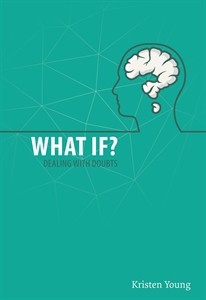WHAT IF?
By Kristen Young
Fervr: CEP, 2014
Reviewed by Adam Cetrangolo
Adam is a Pastor and Church Planter currently serving at St Catharine’s Anglican Church at Caulfield South. He is currently the Branch Chair of EFAC Victoria-Tasmania and the National Secretary of EFAC Australia.
Whether you are a teenager or you work with teenagers, Kristen Young’s compact book: What If? Dealing with Doubts is an excellent resource to help stimulate your thinking about the key apologetic issues associated with the Christian faith.
In her forward, Young invites the reader to see each theme as Beginnings of answers. As an accompaniment, however, she includes references at the end of each section to further related reading materials authored by well-known Christian leaders and thinkers. Therefore while this work is designed with teenagers in mind, it is both robust in its treatment of apologetic issues as well as thorough in scope for the reader to independently delve deeper into the issue.
Secondly, Young also invites the reader to utilise What If? as a reference guide, suggesting that the reader is likely to not necessarily read the book from cover-to-cover but rather refer to the various sections that are immediately relevant to them.
The book itself is in a type of narrative style that feels more like a dialogue than a monologue. Organised around five broader themes of God, Jesus, the Bible, Me and Life, Young has structured the themes around the kind of questions teenagers might ask, i.e. Is doubt wrong? … What if …? … and So what? What follows is an easy-to-read blend of personal testimony, examples of young people Young has known or worked with, scripture references and a rich unpacking of scriptural themes in ‘teenage-speak.’ All this is woven together exceptionally well.
A stand-out feature of the book is that amidst the stories and the questions, Young provides meaningful pause for thought. Whether the reader is well-connected in a Christian community or is using the book as their sole means of exploration of the Christian faith, the book doesn’t simply ask Is doubt wrong? (or any question) but invites the reader to explore where their doubt might come from, what external factors influence our capacity to follow Jesus whole-heartedly, etc. The reader is gently invited into a deep heart-exploration while also being provided with the rigorous head-information needed to not immediately dismiss uncomfortable concepts. Each chapter also ends with a helpful summary.
Young provides helpful thinking to challenge popular myths such as truth is relative, science has rendered faith irrelevant, a Christian is a person who never sins, people suffer because of bad karma and salvation is something that we have to earn. When explaining grace in relation to John 3.16, Young good-humoredly writes: The verse doesn’t say, ‘God loved the world so much that he gave his one and only Son, so that whoever tries really, really, really hard to be a good person and doesn’t stuff up might have eternal life is they’re good enough,’ here again demonstrating a good knowledge of her target audience as well as insight into the perhaps unspoken fears of the heart.
In recent months, my wife and I have written and presented an apologetic series for our church. Having done so, I appreciate the challenge of translating Gospel truth to a modern secular context. Young’s book demonstrates a great depth of experience and insight into the culture she is writing for and has done a masterful job of communicating these truths with integrity, wisdom and grace. No small task!
May this work bear much fruit for His Kingdom and His glory.
